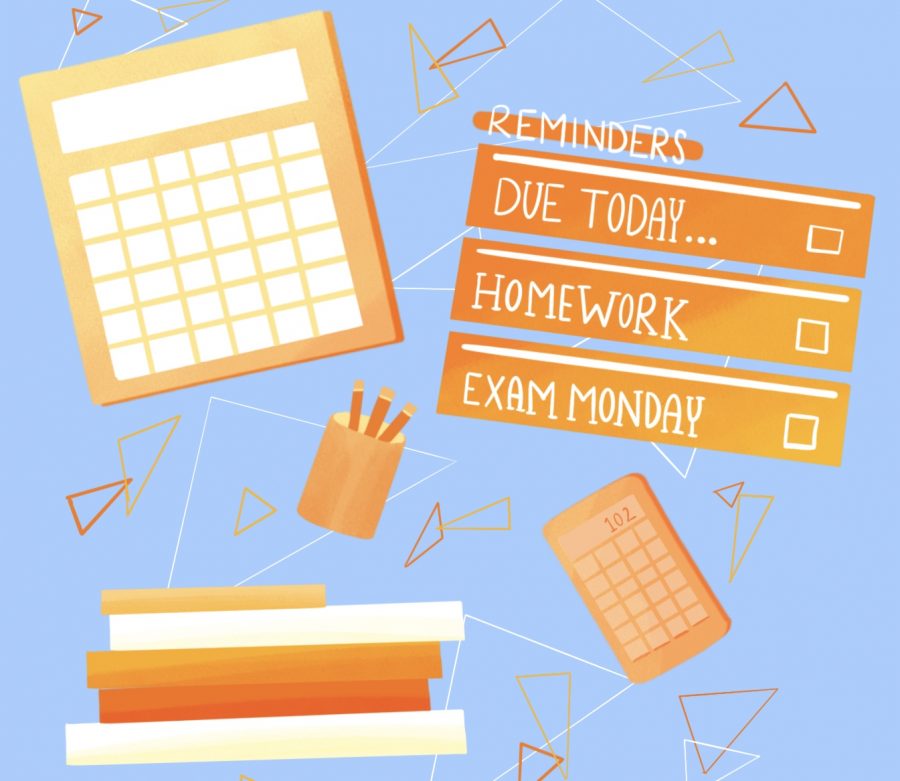- Beavers Digest
- Beavers Digest / Experience
- Beavers Digest / Experience / Campus
- Beavers Digest / Experience / Create
- Beavers Digest / Experience / Wellness
Successful Study Tips for Upcoming Finals
November 30, 2020
It’s that time of year again: finals. Normally, the Memorial Union would be filled with people flocking to see therapy dogs, energy drinks, Kraft mac and cheese would be sold out and every little nook and cranny on campus would reveal a stressed-out student clutching a notebook in a state of panic.
We know how overwhelming finals can be, especially during a pandemic. There are so many different study tips and tricks thrown at you and it’s hard to know which ones are most helpful, right? But never fear! We’ve done the work for you. Here are a few of the most important tips you should take note of as you study for finals.
Tip #1:
Studying a concept? Explain it to someone.
This is a great tip that ironically enough, you might actually learn about if you take cognitive psychology or education courses. When you have to explain a concept, you have to understand it enough to be able to explain it to someone else, who has no idea what you’re talking about. This is a much better study technique than simple memorizing a definition of the concept.
Tip #2:
Reconsider the music you listen to when studying!
I know, I hate to say it – but someone has to. Depending on your responsiveness to external stimulation and your ability to concentrate, certain music might have a negative effect on the studying process. But if you choose the right kind of music that is suited to your specific personality, music may actually improve your cognitive processes and make studying a smarter process.
Basically, it all depends on how honest you are with yourself. Is Drake really who you want to listen to when you’re trying to memorize some chemistry rules? Or would a different artist maybe distract you less? This article from the Scientific American does a great job explaining this in a very concise way – check it out and reconsider your music choices! I promise it’ll make a difference, and it’s only for a few days. As soon as your studying is over, you can go right back to blaring whatever it is you like from your speakers as loud as you want.
Tip #3:
Consider joining a study group!
Zoom classes are strange, it’s true, but I can guarantee that a lot of people in your classes would love to get together and form a study group. Now more than ever, making new connections and reaching out to people is important – for finals and for your mental health. Studying in a group can open up a whole realm of possibilities. The more minds, the more you can address – if done well.
If someone is confused, it’s likely that at least one other person in the group can explain it to them. If you’re studying concepts or key terms, you can quiz each other. When you’re studying for finals, you can all create a shared document and combine notes to make a complete study guide. If members don’t get distracted, a study group is a great way to make friends and study at the same time. Take a look at this Academic Success Center sheet for remote study group activities you can try out.
Tip #4:
Make your study space specifically for studying – but make it appealing to you.
You’ve likely heard this before: make your study space for studying alone. In other words, your bed isn’t cutting it, folks. Having consistency and routine in your studying is important, so try having a study space you use only for studying. Your brain will become trained to focus in that space specifically. But you can make it fun! This isn’t a classroom or auditorium. Add lights, open a window, place some plants nearby – make this space a space for you to feel comfortable and relaxed as you begin studying. Keep your books, charger, notes, pens, highlighters and snacks nearby if you can!
If you can’t access one space for studying alone, then carry your study materials with you so you can transform whatever you do find into a study area. Then, use headphones and do your best to make mental space in your head for studying. Check out this super helpful study cycle created by OSU’s Academic Success Center to set up a schedule!
Tip #5:
Studying isn’t just about your mind. Take care of your body.
We’ve all had those moments when you break away from the screen and realize you haven’t moved in two hours. Suddenly your neck feels like it’s stuck, turning your head hurts and your eyes are dry. There are ways to prevent this though – I promise.
First of all, try to move and stretch for at least 5 minutes per hour – this increases your physical health and cognitive function. Maybe try a 30 minute interval cycle, where you sit for 20 minutes, stand for 8, and move for 2.
Perhaps most importantly – because I know our posture as college students is horrible – be conscious of how you sit. Try to avoid recliners, couches and beds (this relates to having a space dedicated only to studying), as they’re really bad for your posture. Save those comfy cushioned chairs for after your studying as a reward!
Ideally, the top of your screen should be at or below eye level and the screen should be about an arm’s length away. Try to keep your feet flat on the floor, and blink. A lot! Use the 20-20-20 rule – every 20 minutes, look at something at least 20 feet away for at least 20 seconds.
Take care of yourself, both your mind and body. It’s too easy to lose track of yourself and your health when you feel stressed. No exam is worth the deterioration of your physical or mental health. Just remember: winter break is almost here! We believe in you.






